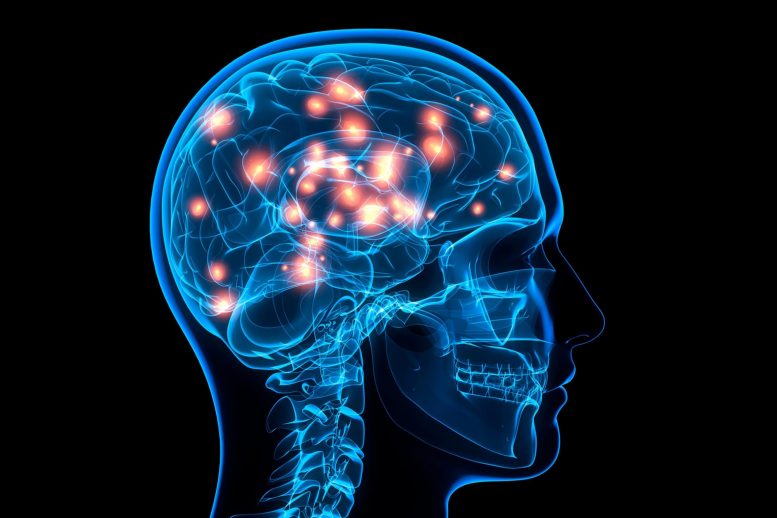
Dopamine is often described as the brain’s “feel-good” chemical associated with reward and pleasure.
Neuroscientists show that mice can learn to manipulate random dopamine impulses for reward.
From the thrill of hearing an ice cream truck approaching to the spikes of pleasure while sipping a fine wine, the neurological messenger known as dopamine has been popularly described as the brain’s “feel good” chemical related to reward and pleasure.
A ubiquitous neurotransmitter that carries signals between brain cells, dopamine, among its many functions, is involved in multiple aspects of cognitive processing. The chemical messenger has been extensively studied from the perspective of external cues, or “deterministic” signals. Instead, University of California San Diego researchers recently set out to investigate less understood aspects related to spontaneous impulses of dopamine. Their results, published on July 23, 2021, in the journal Current Biology, have shown that mice can willfully manipulate these random dopamine pulses.
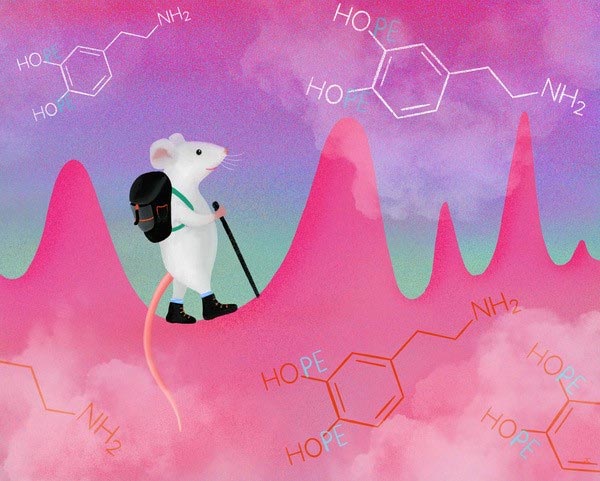
UC San Diego researchers and their colleagues have discovered that spontaneous impulses of dopamine, the neurological messenger known as the brain’s “feel good” chemical, occur in the brains of mice. Credit: Julia Kuhl
Rather than only occurring when presented with pleasurable, or reward-based expectations, UC San Diego graduate student Conrad Foo led research that found that the neocortex in mice is flooded with unpredictable impulses of dopamine that occur approximately once per minute.
Working with colleagues at UC San Diego (Department of Physics and Section of Neurobiology) and the Icahn School of Medicine at Mount Sinai in New York, Foo investigated whether mice are in fact aware that these impulses–documented in the lab through molecular and optical imaging techniques–are actually occurring. The researchers devised a feedback scheme in which mice on a treadmill received a reward if they showed they were able to control the impromptu dopamine signals. Not only were mice aware of these dopamine impulses, the data revealed, but the results confirmed that they learned to anticipate and volitionally act upon a portion of them.
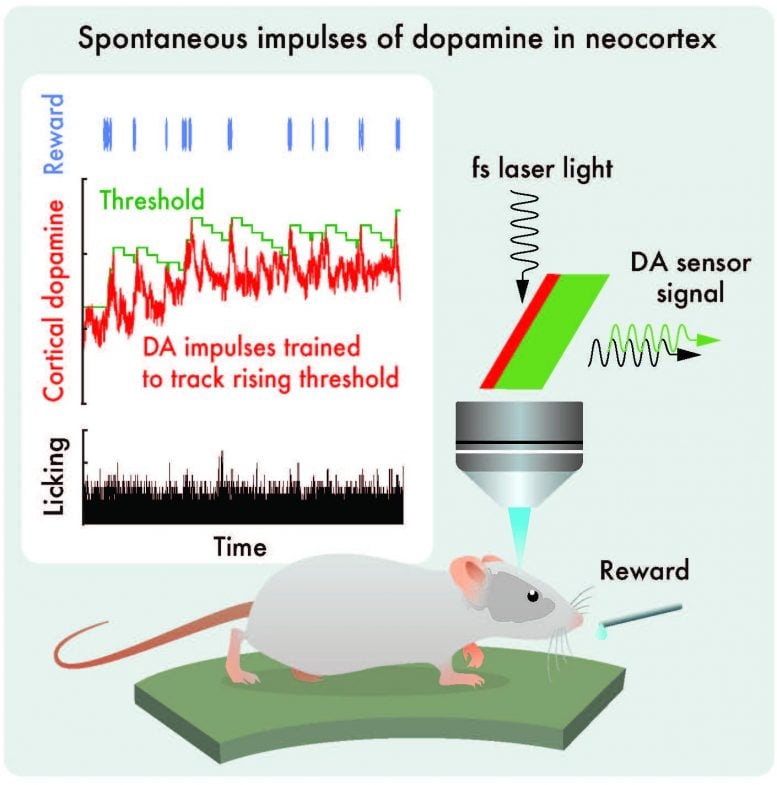
UC graduate student Conrad Foo and his colleagues found that spontaneous impulses of dopamine occur in the cortex of mice at a rate of approximately 0.01 per second. Using a reinforcement learning paradigm based on rewards, mice learned to volitionally modulate their spontaneous impulses. Credit: Julia Kuhl
“Critically, mice learned to reliably elicit (dopamine) impulses prior to receiving a reward,” the researchers note in the paper. “These effects reversed when the reward was removed. We posit that spontaneous dopamine impulses may serve as a salient cognitive event in behavioral planning.”
The researchers say the study opens a new dimension in the study of dopamine and brain dynamics. They now intend to extend this research to explore if and how unpredictable dopamine events drive foraging, which is an essential aspect of seeking sustenance, finding a mate, and as a social behavior in colonizing new home bases.
“We further conjecture that an animal’s sense of spontaneous dopamine impulses may motivate it to search and forage in the absence of known reward-predictive stimuli,” the researchers noted.
In their efforts to control dopamine, the researchers clarified that dopamine appears to invigorate, rather than initiate, motor behavior.
“This started as a serendipitous finding by a talented, and curious, graduate student with intellectual support from a wonderful group of colleagues,” said study senior co-author David Kleinfeld, a professor in the Department of Physics (Division of Physical Sciences) and Section of Neurobiology (Division of Biological Sciences). “As an unanticipated result, we spent many long days expanding on the original study and of course performing control experiments to verify the claims. These led to the current conclusions.”
Reference: “Reinforcement learning links spontaneous cortical dopamine impulses to reward” by Conrad Foo, Adrian Lozada, Johnatan Aljadeff, Yulong Li, Jing W. Wang, Paul A. Slesinger and David Kleinfeld, 23 July 2021, Current Biology.
DOI: 10.1016/j.cub.2021.06.069
The full authors list of the paper includes: Conrad Foo, Adrian Lozada, Johnatan Aljadeff, Yulong Li, Jing W. Wang, Paul A. Slesinger and David Kleinfeld.
Funding: BRAIN Initiative, National Institutes of Health


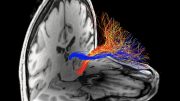




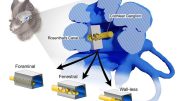

The article says nothing about nothing. There’s no point to the blah blah blah article. No surprise.
In the same way that cortisol is released in response to an imagined danger or stress, these mice seem to simply anticipate the reward, releasing dopamine, not actually control its release. Because of the timed intervals the mice learned when to anticipate. That does not in any way mean we can control it. It just proves that anticipation and the thought of being rewarded makes mice feel good.
It’s amazing the time, effort and money spent on useless reseach
I’m pretty sure neither of you read the article
I feel sorry for journalists. At work, “Joe we need to talk about your article quota… 3 articles is only the bare minimum… Sally writes 17 articles a month, and gets a ton of clicks while doing it. You don’t want to be a person who only does the bare minimum now do you?” Joe: “But Steve, there’s nothing to write about. I would literally have to write articles full of bad science and click bait in order to write more than 3.” Steve: “Well the shareholders of this website expect a certain amount of money in return or we’ll be shut down.” Joe: “Ok fine I’ll write crappy articles on anything I can find and give them click bait titles… Wow I’m really starting to hate the internet” Steve: “Me too Joe, I feel like it’s actually making everyone dumber.” Joe: “Yeah. Let’s go apologize to Sally for bringing gender into this comment.” Steve: “Yeah sounds good buddy.”
Nothing here. Same as Pavlov’s salivation response.
These articles would not be published if men and women hadn’t spent countless hours in laboratory settings and then had the courage to release their findings. No one works on projects unless they absolutely believe in what they are doing and then would certainly be confident in their findings before releasing to the public. And who do you think was behind their research funding the entire project??? So be careful who you attempt to criticize!
I disagree with the negative comments here. I think this research could potentially lead to natural ways to treat depression and trauma by finding ways to stimulate dopamine release and motivate people to take productive actions. Being able to take this first step can lead to a sense of accomplishment, starting a positive reinforcement loop,without external rewards. For people with trauma, it could help interrupt the negative feedback loop and maybe even start new positive neural pathways.
I agree with Margaret!
#1) natural way to fight depression, trauma & PTSD ( you will see, said the blind man, with no eyes)
& for you novices out there I am not a mouse, I am a human being, who is a recovering addict, & I can tell you dopamine is released with just the anticipation of reward, & yes you can control it because if you do not allow your self to release the dopamine until we say the old adage a bird in the hand is better than two in the bush; so you control the dopamine until it is time (for eruption) oh yes, Pavlov’s salvation response is a conditioned response is a brilliant work & to some degree is controlled ; ( I could wager) to test the degree of dopamine at these intervals along with the seratoin levels, then throw in a robbery of the dopamine to document the response. Curiosity will tell me they will adapt and overcome. Again I am the novice, with a hint of curiosity and a little tenacity to keep the quick witted on there toes, thank you Jesus!